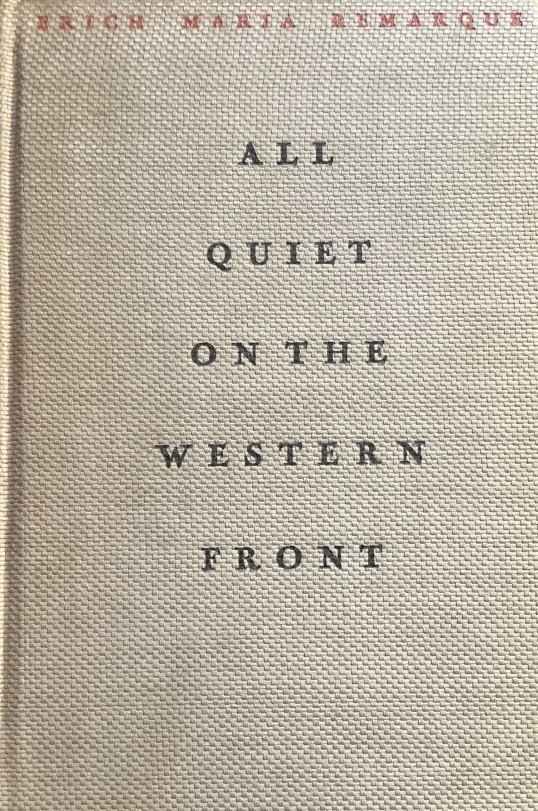Inspiring Older Readers
 posted on 06 Sep 2023
posted on 06 Sep 2023
All Quiet On The Western Front by Erich Maria Remarque
Remarque’s novel of the terror and futility of war seen through the eyes of a German combatant in the First World War has become as iconic as the poetry of British writers like Siegfried Sassoon and Wilfred Owen in providing an articulation of the brutality and destruction of that conflict. So much of what we think we know about that war comes from the novels and poems written by those who were experiencing the war first hand in the trenches. This proximity to the slaughter gives us a real and visceral sense of the death and destruction that so many young men of that generation experienced but it also lets us see how men become brutalised, dehumanised and degraded by what happened to them in the long hours between the actual periods of fighting.
All Quiet On The Western Front is also a remarkable experience for British readers in that it is a book that talks about the ‘enemy’ from the enemy’s point of view – and we’re forced to acknowledge that despite being on opposite sides of the conflict we share an obvious common humanity. Published in book form in 1929 it carries the authority and authenticity of the author’s own experiences fighting in the First World War – and its implicit anti-authority and anti-war messages were enough to get it banned in Germany as the Nazis rose to power. They clearly found the story of a beaten and dejected German army and the suffering of those troops to be an uncomfortable truth that didn’t fit the prevailing narrative of Aryan domination.
What Remarque is especially good at is the banality of war as mass slaughter. Left for long stretches in relative boredom with nothing to do, the front-line soldiers fill the time by either fantasizing their lives away or simply obsessing on how they will meet their end. What they never think about is the greater good, the big picture or the grand strategy. Their lives are filled by little battles, small defeats and small gains in the overall game of survival. New recruits are bullied by martinets who love exercising power, systematically starved of nutritious food (turnip jam anyone?), thrown into combat zones without proper preparation and have to watch as one by one their comrades are literally torn to shreds by bullets and shells.
Every now and then they find some consolation and the chief source of that is food – usually illicitly obtained - and tobacco supplemented on one occasion by a visit to the officers bordello. But the days between the fearful adrenalin of bombardment and attack mostly revolve around trapping lice and killing the bloated rats who will literally eat anything.
Our eyes and ears in all of this is Paul Bäumer, who is chivvied into joining up by his schoolteacher and along with several old classmates they form the core of the novel as they seek to survive. Slowly, one at a time, the classmates meet their seemingly inevitable deaths. Bäumer grows up and becomes a hardened soldier – old before his time but, for the most part, luckier than his peers. He is wounded but not severely enough to avoid being sent back to the front and he becomes effectively institutionalised by the war – being in the trenches becomes the one thing he can really understand and his comrades the only people he can relate to. When he is given a period of leave to return home, he discovers he can no longer integrate into the old world he came from. He has seen and done things the people at home can’t understand or imagine and he can no longer communicate his feelings even to those closest to him. What he most wants is simply to return to the trenches where he understands what the rules are.
In the last third of the book a sort of fatalism starts to settle on Paul – he knows there is no future for him, no place to return to. The war has made him someone who can’t imagine the world without danger and conflict and we also start to get the feeling that there’s no way out for him. When his last and closest friend, Kat, is killed the full unreality of what he has experienced fills him with a kind of existential dread that he can do nothing but accept.
In 1918 news starts to filter through to the troops of a likely armistice but Bäumer finds it impossible to imagine the truth of that or what it might mean. It is at this point Remarque steps out of the book and switches the focus away from Paul in order to announce his death in October 1918, one month before hostilities ceased for good.
The end of the book that gives it it’s title is a piece of pure bathos. On the day we are told Paul Bäumer died the news media report nothing special happening on that day and that all is quiet on the Western Front. This is, in fact, a creative mistranslation of Remarque’s actual original title which was ‘nothing new on the West Front’ which I actually prefer because of its intentional ambiguity and implicit bitterness.
The book never fails to move me – not in obvious or sentimental ways but through its restraint, through its matter-of-factness but ultimately through its sheer recognisable portrait of what it means to be human and have that humanity tested to its limits. Brilliant stuff.
Terry Potter
September 2023